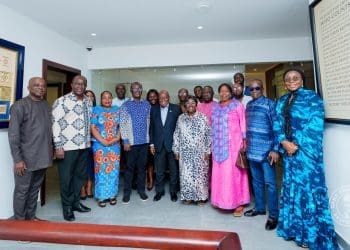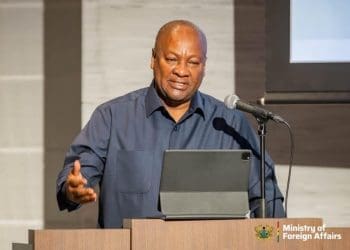His Honour Samuel Bright Acquah, the embattled Circuit Court judge at the Accra Circuit Court 9, bows out of the Bench on September 16, 2025, amid heated national debate over a ruling that critics say dangerously undermines Ghana’s constitutional principle of equality before the law.
Born on September 16, 1965, Justice Acquah was called to the Bar on October 1, 2010, appointed to the Bench on March 8, 2018, and stationed at Circuit Court 9, Accra, on August 13, 2020.
He has presided over several cases since then.
Even as he retires, controversy surrounds his future. On August 20, 2025, he appeared before the Judicial Council for vetting after applying for elevation to the High Court bench.
He was shortlisted and awaits possible swearing-in by President John Dramani Mahama, alongside about 50 other candidates.
The outstanding question is whether the President will proceed with his appointment despite the storm surrounding his recent ruling.
Not all Ghanaians are equal – The Abronye Case
The controversy stems from Justice Acquah’s ruling in Republic v. Kwame Baffoe @ Abronye, where the judge declared that while the law promises equality, in practice some individuals—particularly those in positions of power—deserve greater protection.
Echoing George Orwell’s satirical words in Animal Farm—“all men are equal, but some are more equal than others”—the judge suggested that criticisms or insults directed at high-ranking officials such as the. Inspector General of Police (IGP) carry more weight than those against ordinary citizens.
This stance has sparked outrage across the legal community.
The Ghana Bar Association (GBA) condemned the ruling and expressed concern about its implications for justice and free speech.
A dangerous judicial doctrine
Critics argue that Justice Acquah’s position risks entrenching a two-tier justice system, where the politically powerful enjoy special protection while ordinary Ghanaians face harsher consequences for similar offences.
In his ruling, the judge leaned on a controversial adage widely attributed to the late Ugandan dictator Idi Amin—though he misattributed it to Robert Mugabe: “I can assure you of freedom of speech but not freedom after speech.”
The choice of quotation shocked many, with lawyers and academics questioning why a sitting Ghanaian judge would cite the words of a military leader notorious for repression to justify restrictions on political expression.
Selective freedom of speech
According to Justice Acquah, criticism of government policies is permissible, but direct attacks on individuals, especially powerful officials, must be punished.
While he justified his decision by citing concerns over insults and declining civility in Ghanaian political discourse, legal experts warn that such reasoning dangerously narrows the scope of legitimate free speech.
“The ruling suggests that freedom of expression ends where the powerful are concerned,” said one Accra-based constitutional lawyer. “That’s a direct threat to democracy.”
Consistency that hurts the weak
Justice Acquah defended his position by pointing to past cases, including Republic v. Raphael Okai Ankrah in May 2023, where an NDC supporter was remanded for insulting then-President Nana Akufo-Addo, and Republic v. Emmanuel Kwakye, a Wontumi TV journalist, who suffered a similar fate.
He argued that the courts have been “consistent” in punishing such offenders across political administrations.
However, critics note that this consistency largely falls on individuals without significant political clout, underscoring a system that punishes the weak while shielding the influential.
Bail denied under Orwellian Logic
In the Abronye case, Justice Acquah denied bail under Section 96(5) of the Criminal Procedure Code, citing the likelihood of repeat offences and possible absconding.
Abronye was remanded into National Intelligence Bureau custody until September 19, 2025.
Observers say this reflects a worrying trend of using remand as punishment rather than due process, particularly for misdemeanour cases.
For ordinary citizens, the precedent signals that even minor remarks could result in indefinite detention under the banner of “national security.”
Chilling effect on democracy
The implications of this ruling are far-reaching. If accepted uncritically, it means freedom of speech in Ghana is conditional—safe when directed at the powerless but dangerous when aimed at the powerful.
Civil society groups warn that such a judicial philosophy could shrink Ghana’s civic space, entrench inequality in the justice system, and insulate the political elite from public scrutiny.
“The principle of equality before the law is the bedrock of democracy,” noted the Ghana Bar Association in a statement. “Undermining it threatens not just justice but the survival of democratic governance itself.”
A call for vigilance
As Justice Acquah retires from the Circuit Court bench, his future as a potential High Court judge remains uncertain.
But his ruling has already left a lasting mark, stirring debate about fairness, free speech, and the independence of the judiciary.
For many observers, the controversy is a wake-up call. Unless vigorously challenged, it could pave the way for a judiciary that privileges the elite and punishes the vulnerable, eroding the promise of equality under Ghana’s Constitution.
“The less privileged—the students, traders, and workers—stand to lose the most if we accept this doctrine,” said one civil society activist. “Justice must remain blind to status, position, or power. Anything less is injustice.”











